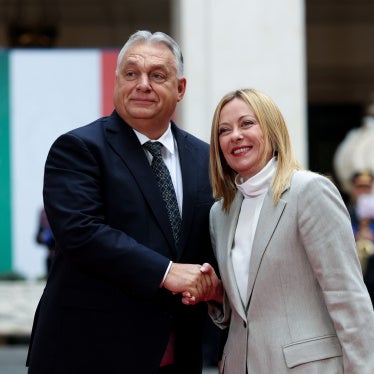Following the arrest of three Kosovar Albanians indicted by the International Criminal Tribunal for the former Yugoslavia (ICTY) by NATO forces, Human Rights Watch said today that the event is an important step for the cause of justice in the Balkans.
On Monday, February 17, troops of the NATO-led Kosovo Force (KFOR) arrested three former Kosovo Liberation Army members on war crimes charges. According to the ICTY indictment, the three served as wartime “commanders/guards” at a prison camp in the Glogovac/Gllogofc area and are charged with war crimes and crimes against humanity against Kosovo Serb and Albanian civilians in mid-1998.
Haradin Bala, Isak Musliu and Agim Murtezi are the first Kosovo Albanians publicly indicted by the ICTY. Authorities in Serbia have argued that the absence of indictments of Kosovo Albanians is evidence of the tribunal's bias against Serbs.
“These indictments defeat the claims of the Tribunal's critics that it was ignoring abuses committed by Kosovo Albanian rebels,” said Elizabeth Andersen, executive director of the Europe and Central Asia Division of Human Rights Watch. “It is clear that the Tribunal prosecutor will issue indictments against alleged war criminals on all sides, if and when she gathers compelling evidence. Authorities in the region should do more to assist the tribunal in that effort.”
The Tribunal had also issued a fourth arrest warrant for Fatmir Limaj, a former member of the KLA general staff. According to some press reports on Tuesday evening, Limaj was taken into custody outside Kosovo earlier that day and was about to be transferred to The Hague. The indictment against the four contains nine counts of unlawful imprisonment, torture, murder and the cruel treatment of Kosovo Serb and Albanian civilians held at the Lapusnik/Llapushnik Prison Camp of the KLA. According to the indictment, Limaj was “responsible for the operation” of the prison camp.
Human Rights Watch welcomed the recent arrests but cautioned that they are only one step on the long road to a full accounting of crimes committed in Kosovo. Human Rights Watch urged the authorities in Serbia and Montenegro and U.N.-administered Kosovo to step up efforts to prosecute persons implicated in war crimes.
“There is still a huge justice gap relating to Kosovo,” Andersen said. “The Tribunal should hold the most senior alleged war criminals of all sides accountable, but accountability for lower-level war criminals is also vital to long-term hopes of reconciliation.”
Human Rights Watch said that the local authorities who must bring lower-level perpetrators to justice have to date not risen to the task.
Serbian courts have opened only three war crimes cases so far arising from the 1998-99 events in Kosovo, although the number of perpetrators within their jurisdiction is in the hundreds. At the same time, the ICTY and the Kosovo courts have a huge task to prosecute crimes against non-Albanians during and after the war. After three and a half years of international administration, the Kosovo judiciary has failed to indict anyone for war crimes against non-Albanians, and only a handful of people have been successfully prosecuted for war crimes against Kosovo Albanians.
The ICTY indictments confirm credible reports that Kosovo Albanian rebels are responsible for serious violations of international humanitarian law in multiple incidents during the 1998-1999 armed conflict with the Belgrade forces. In that same conflict, Serbian forces waged a campaign of massive killings, expulsions and destruction against Kosovo’s ethnic Albanian population.






